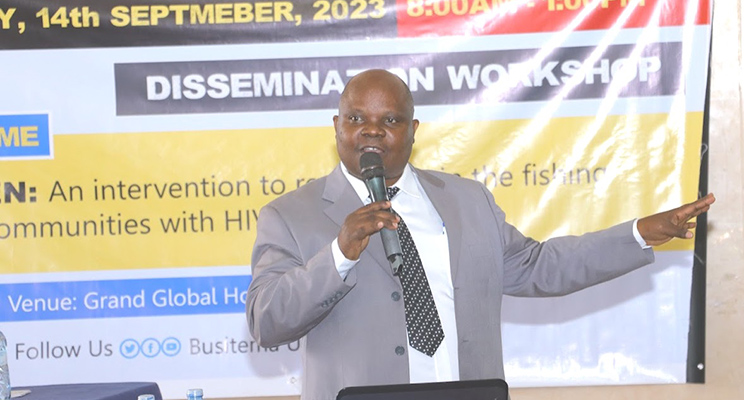PEST4MEN study shows promise for reaching highly mobile men in the fishing communities with HIV testing services in Uganda

PEST4MEN (peer-led HIV self-testing intervention for men) has demonstrated that it is possible to improve the uptake of HIV self-testing services among highly mobile men in fishing communities by working with men to reach men.
Led by EDCTP Career Development Fellow Dr Joseph KB Matovu (Uganda), the results of the PEST4MEN study were presented at the Grand Global Hotel in Kampala, Uganda on 14 September 2023. The study showed that the use of men to reach fellow men resulted in 99% uptake of HIV self-testing services among men who were enrolled in the study.
“We identified men from existing social networks and trained them in how to distribute HIV self-test kits as well as in how to conduct the test and interpret the results. These men (also referred to as “peer-leaders”) were asked to refer up to 20 men from their social networks. All men referred to the study team by the peer leaders were screened for study eligibility, and those who were found to be eligible were administered a baseline questionnaire. Men who were interviewed were asked to go to their peer-leaders to pick up kits”, Dr Matovu emphasised.
For each of the 400 men who were enrolled in the study, two kits were given to their peer-leaders for a total of 800 kits distributed in the two study districts. Peer leaders distributed 782 kits (98%) to their social network members, suggesting that this is a highly feasible intervention within a fishing community setting. At the next follow-up visit, two months after the men were enrolled in the study, 361 men were located and interviewed (up to 48% of those who were not located had moved outside the fishing community at the time of the visit). Of these, 355 reported that they actually received HIV self-test kits from their peer leaders, and 352 (99%) of them indicated that they used the kits to self-test for HIV. This suggests a high level of acceptability of this peer-led HIV self-testing intervention. “Each social network member was asked to return their used kits for re-reading by a member of the study team. We found a high correlation between the respondents’ own reading of the results on the used kits and the results read by a member of the study team”, Dr Matovu concluded.
The study found a high HIV prevalence in the fishing communities: overall, 14.5% (51) of the men who self-tested for HIV in the two study districts were HIV-positive; higher in Kalangala (19.5%) than in Buvuma (9.5%). The prevalence of HIV in these island districts is thus much higher than the average national adult (15-49 years) HIV prevalence of 5.5% based on recent data from the 2020 Uganda Population-based HIV Impact Assessment (UPHIA). Matovu attributed the high HIV prevalence in the fishing communities to engagement in risky sexual behavior. For instance, of the 400 men interviewed at baseline, 58% reportedly engaged in sex with more than two sexual partners in the past 3 months. When asked how often they used condoms with those partners to protect themselves against the risk of HIV infection, only 13.3% of 173 men reported using condoms consistently; 54.3% reported inconsistent condom use, while 32.3% reported that they had never used condoms. Of men who self-tested HIV-positive, 31% were newly diagnosed with HIV and 88% sought confirmatory HIV testing. Of those confirmed as HIV-positive, 71% were linked to HIV care. “These men would not have known that they had HIV if we had not delivered the intervention at the community level, suggesting that this intervention can successfully identify men with HIV who can be linked to HIV care”, Dr Matovu argued.
As part of the EDCTP Career Development Fellowship, Dr Matovu supervised one Master of Public Health (MPH) student at Busitema University. This student, Aisha Namwama, served as the Study Coordinator for the PEST4MEN study and had the opportunity of nesting her MPH research into the main study, with overall supervisory support from Dr Matovu. Aisha’s study focused on HIV self-testing and linkage to HIV care preferences among highly mobile men in the Buvuma district. She also disseminated her findings at the event on 14 September 2023.
The dissemination event was attended by 45 physical participants and up to 43 online participants. The findings were further disseminated via two local television stations and one mainstream print newspaper with national coverage. Stories of the event were captured and shared via social media, X (formerly Twitter), and online newspapers. Below are some of the links to the online articles.
- Watchdog Uganda: Use men to reach fellow men with HIV testing services in the fishing communities – Study
- ChimReports: Study: Peer-Led HIV Self-Testing Thrives, Unearths New HIV Cases in Buvuma and Kalangala Fishing Communities
- Uganda Radio Network: Men Prefer Receiving HIV Test Kits from Peers than Testing at Hospitals-New Study
The dissemination event was attended by Prof. Julius Wandabwa (Dean, Busitema University Faculty of Health Sciences) who officially opened the workshop. A summary of the proceedings was captured on the University website here.
The dissemination meeting was attended by representatives from the media, the Uganda AIDS Commission (the national HIV and AIDS Coordinating Entity in Uganda), the Ministry of Health, Kalangala District Local Government, Buvuma District Local Government, and selected peer leaders from the two fishing communities where this study was implemented. Study findings will help to inform the design of a larger trial, preferably a cluster-randomised intervention trial, implemented in additional fishing communities to further assess the population-level effects of a social network-based, peer-led HIV self-testing intervention on HIV testing uptake, linkage to and retention in HIV care.
